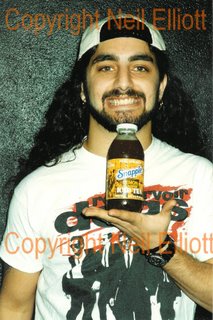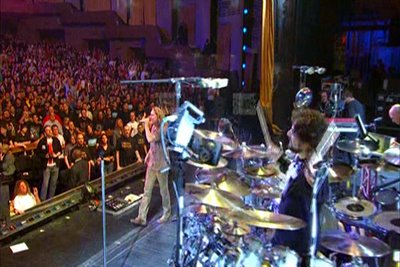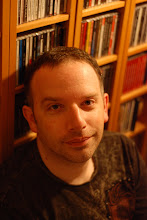Here's the full text of an interview with Mike Portnoy - part of which was used in the new issue of Classic Rock. That article has a round-table type discussion with a load of prog luminaries, and consequently there would never have been room for the full interview with Mike. So I thought the full transcript might as well be seen rather than sit on my hard drive. The questions were set in advance, not by myself, so if some seem a tad obvious then don't blame me!
What is prog?
MP: “I think progressive music is generally defined by an emphasis on musicianship, longer songs, untraditional arrangements, long instrumental passages and also an exploration of lots of different styles. I think those are the general characteristics.”
Do you consider what you do to be prog rock?“Oh absolutely, Dream Theater are a progressive band. I wouldn’t necessarily say we were prog rock. I think we’re more of a prog metal band as we’re kind of combining two, but yeah, we’re not afraid of the progressive tag.”
Why are so many prog bands embarrassed to be called prog?
“I think they were mainly embarrassed during a period in the eighties when prog was a dirty word. Prog had its day in the seventies and then died when disco and punk came around. So in the eighties it was fashionable to shy away from the word prog. So that was when the classic prog bands, like Genesis and Yes, kind of re-invented their sound to get away from progressive elements and comparisons. But I think in the nineties until now, the word is not as much of a taboo as it used to be. A lot of the bands actually embrace it these days. Occasionally you’ll get a mainstream prog band like a Tool, Mars Volta or Coheed And Cambria who are scared of having that word attached to them because it might hurt their profile in the mainstream press. But for the most part, this whole new generation of progressive bands – and there are literally hundreds of them out there – embrace the description.”
Why did so many prog bands, such as Yes and Genesis blatantly sell out in the eighties?“I think prog became such a negative word that they simply had to change in order to still have a career. Through the early to mid-eighties those bands changed and became massive, and bigger than they had even been if they had stayed in true prog form. They needed to change to survive and there also needed to be a cooling off period. There are also bands that fell through the cracks, like Marillion, IQ, Pendragon and Twelfth Night, who existed during that time when prog was a dirty word. Then when prog came around again, like for example in the early nineties when our album Images And Words broke, it opened up a mainstream acceptance to this style of music again.”
Is prog ‘a sound’ or an ethos? IE is it bands that sound like Floyd, Yes, Genesis etc, or must it always be, by definition, progressive, forward-looking music?
“I don’t think there’s so much of a sound these days as a style. There are so many progressive sub-genres now. You can have bands like The Flower Kings who sound like traditional prog, but then there are bands like Mastodon or Opeth who are obviously metal bands but with serious prog undertones. So there’s not really a progressive sound so much as it is a defining style that can come in various shapes and sizes.”
Is the natural destination of prog electronica like Tangerine Dream etc? (More and more prog acts have an ambient side-project etc)
“I think that’s certainly a side of it. Tangerine Dream and Ozric Tentacles are a good examples but it’s more like a psychedelic prog. Isis also embraces that kind of style, and to a certain extent even O.S.I kind of created that electronic, ambient prog. I wouldn’t say it was a natural destination, but it is definitely another sub-genre.”
Some ‘prog’ bands seem to be retrogressive – i.e. aping the sounds and styles of Pink Floyd, Yes, Genesis, Rush etc – can they still be prog?
“Well they are progressive. This is really talking about the word progressive in terms of a sound or a style, and not necessarily a direction. Bands like The Flower Kings, Echolyn and early Spock’s Beard sound like Yes, Genesis or Gentle Giant and those are perfect examples. They are modern prog even though they are leaning on more retro sounds in terms of the instrumentation and production but they are absolutely carrying the torch for that seventies sound, into the new millennium.”
What do you think of the following interpretation: in the 70s prog rock got too indulgent, with too many guitar solos and 20 minute songs, so punk came along and brought things back to basics, killing prog and staying true to the spirit of rock’n’roll?
“Well I agree with all of that, as is it a fact up to the part about staying true to the spirit of rock’n’roll. That I don’t agree with. Rock’n’roll can be many different things to many different people. I could tell you as a fan that I loved the Sex Pistols, The Ramones and The Clash just as much as I did Pink Floyd, Yes and Genesis. They were different things that appealed to different sides of me as a listener and music fan. One is raw and simple, the other is more complex and elaborate, but as to what is true rock’n’roll? Who could define that?”
Could prog rock have existed without public schools? Was it (is it still) music made by "posh boys"?
“Yes it was and it is. Even down to Dream Theater’s case as we were formed at a music college. It seems that most progressive musicians, and also the fans, are the ones who are studious and want to be intellectual. So for better or for worse, that seems to be the case, stemming from Pink Floyd all the way up until now.”
Was prog originally a very British affair? Is it still?
“It was for sure. If you look at the big five of Pink Floyd, King Crimson, Genesis, Yes and ELP, they are all British. So the sound stemmed from there but it branched off through the years. Rush are one of the essential prog bands of the seventies and they were Canadian. Then American bands started to embrace the sound and you ended up with bands like Kansas and Styx. Through the eighties and nineties it got embraced by American Metal bands like Metallica, Fates Warning, Queensrÿche and Dream Theater. And now there is a huge European scene coming out of Scandinavia, Germany and Italy where countless prog bands are being spawned. So yeah, it started in England, so you guys get the honour or the shame of inventing the sound.”
Why don't girls like prog?
“Good question! We’ve been asking ourselves that one for twenty-years [laughs]. I mean, if you look at a Dream Theater show, it is ninety-five percent guys and five percent are their wives or girlfriends. I don’t know why. Maybe it’s because prog music generally appeals to musicians and I suppose there’s a bigger percentage of male musicians than there are female. And it’s never been about being a pretty boy, the looks or the image. It has always been about the music. So maybe that’s a reason.”
When does prog become ‘fusion’?“I don’t know how to answer as to when it becomes fusion. There is another side to prog which is that whole fusion, instrumental side. To me, it started with Frank Zappa. He was the first to combine fusion, instrumental musicianship with progressive elements. After that there was the Mahuvishnu Orchestra, Return To Forever and the Dixie Dregs. These are all bands – usually instrumental – where every musician was just the top of their game. And that tradition has continued to this day, with bands like Niacin or Planet X who are doing that type of music.”
Is there more than one kind of prog rock? [eg are Tool part of the same prog rock as Dream Theater etc]
“No there isn’t one kind of prog rock, there are literally dozens. Yes, I would consider Tool a progressive band and Dream Theater a progressive band, but we are surely two different sides of prog rock. We embrace some of the more traditional prog rock elements, whereas Tool are taking it, twisting it and taking it to a darker and more gothic direction. So you can have a band like Coheed And Cambria who are considered progressive but they are more like a pop punk band. Mastodon and Opeth are taking it to a more death metal prog direction, and Mars Volta is more of an ambient, psychedelic ambient direction.”
When did you first hear the term 'progressive' applied to music?
“I think it began with Sgt. Pepper. The Beatles weren’t a prog band but in some ways it can be considered the first prog album because that was the first release that was conceived as an album and not just a collection of songs. It was such an experimental album sonically in terms of production and recording techniques, and they broke every rule with that album. Right after that came Pink Floyd’s debut album, although they were song oriented when they were with Syd Barrett but it was still psychedelic and experimental. Shortly after that, King Crimson’s In The Court Of The Crimson King came out and those can be pinpointed as the beginnings.”
A lot of dance music/electronica is experimental/trippy/conceptual (The Orb, Aphex Twin etc etc). Why is that considered cool when prog is not?
“I’d say because people who listen to dance music are on ecstasy. [laughs] But I wonder why if you took a standard punter off the streets in London, they would think Tool are so fucking cool, but Dream Theater isn’t. I ask myself that question all the time. You know, why is Tool so embraced by the mainstream and yet I think our music is so much more mainstream than theirs. You know, we’re churning out songs like I Walk Beside You or even something like Never Enough. Those songs are way more accessible than anything Tool have ever written and yet they are considered so much more mainstream than us. So it’s an interesting question and I don’t know. Maybe it’s their image versus ours, as we’ve never really thought about that, whereas Tool’s image is very modern and gothic.”
Is it possible to make prog cool again?
“Well Tool and Mars Volta are. I think they are the two best examples of prog bands that are considered cool.”
Was it ever cool?“In the seventies it was. If you look at the period from 1971 to 1973, Yes put out Close To The Edge and Fragile, Genesis released Selling England By The Pound, Foxtrot and The Lamb Lies Down On Broadway. ELP had Brain Salad Surgery and every one of these bands were putting out classic albums that were fully embraced. They were playing stadiums and getting AOR radio exposure for these eight or ten minute songs. So believe it or not, there was actually a time when prog was cool. You also have to realise what else was out there at that time. You know, Mungo Jerry or whatever. Even in the mid-seventies, you had Linda Ronstadt and The Eagles, so seeing Keith Emerson in ELP destroying a keyboard with knives was infinitely cooler than going to see The Eagles.”
Is there a link between making (or listening to) prog and taking drugs?
“Definitely in the early days. I thing the Sgt Pepper album and Pink Floyd which spawned prog music, those bands were fully embracing the whole drug scene. I think a lot of the seventies stuff is rooted in the hippy mentality of The Grateful Dead and later on bands like Phish. They were progressive bands as well. So yeah, there’s a big drug side to it.”
Now that rock has been taken to all of its various extremes, is there really a need for prog?
“More than ever. If you look at the crap when you open up a Rolling Stone magazine or put on MTV, it’s all reality TV, shitty dance music and boy bands. Corporate rock is stale and contrived and boring. So if you’re a musician and you actually want to play your guitar, there aren’t many roads that you can take that are going to be fulfilling and exciting. So although prog died in the eighties before resurrecting in the nineties, I think it is now bigger, stronger and more varied than ever.”
What’s the maddest concept album?
“I would say The Lamb Lies Down On Broadway by Genesis. It’s one of my favourite Genesis albums and I love it. But I have listened to it hundreds of times and I to this day have no idea what the fuck it is about.”
What’s the best epic song?“I’d have to ramble off a few as I couldn’t possibly pick one. Close To The Edge by Yes and Supper’s Ready by Genesis. Not to pat myself on the back, but I think there are any number of Transatlantic songs like All Of The Above, Stranger In Your Soul or Duel With The Devil really are modern prog masterpieces. What we did with Transatlantic was take the elements of classic prog in all our favourite prog bands and do it now. We kept that sound and that style, but took it to the new millennium.”
Which musician or band has stayed closest to the spirit of prog?
“Me and Neal Morse [laughs]. No, in terms of the old-school people I would say King Crimson. Robert Fripp is still as daring and adventurous today as he was when he started King Crimson almost 40 years ago. Perhaps it’s because they never achieved real commercial success as the other four of the so-called big five of Genesis, Yes, Pink Floyd or ELP did? In any case, he has constantly re-invented Crimson every ten years or so and created quintessential prog albums for each decade with a completely different band and sound each time. In the sixties there was In The Court of The Crimson King, Red in the seventies, Discipline in the eighties, in the nineties there was Thrak and The Power To Believe in 2003.”
Should prog bands ever release singles?
“Yes, but I think the best singles that were hits from progressive bands were those that weren’t supposed to be singles. Like Roundabout by Yes or Carry On Wayward Son by Kansas. These were songs that became radio hits but weren’t written to be radio hits. I can also relate to that with Dream Theater’s Pull Me Under, which was also that kind of song and somehow became a radio hit.”






